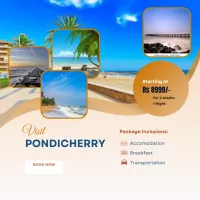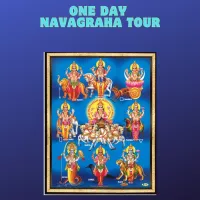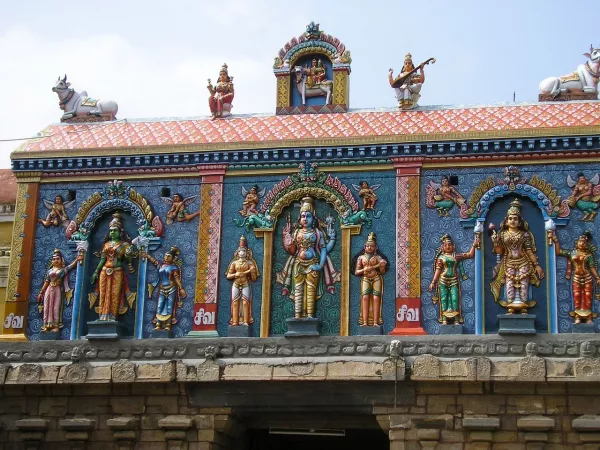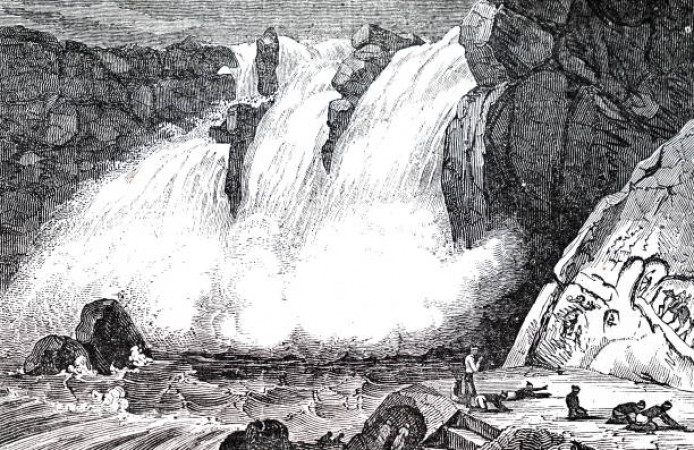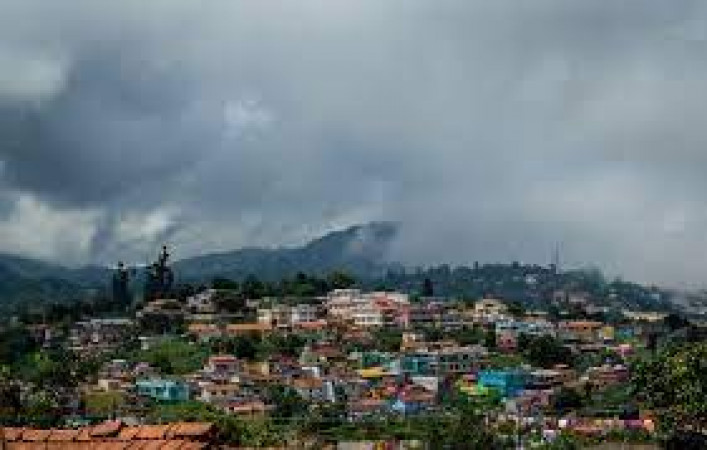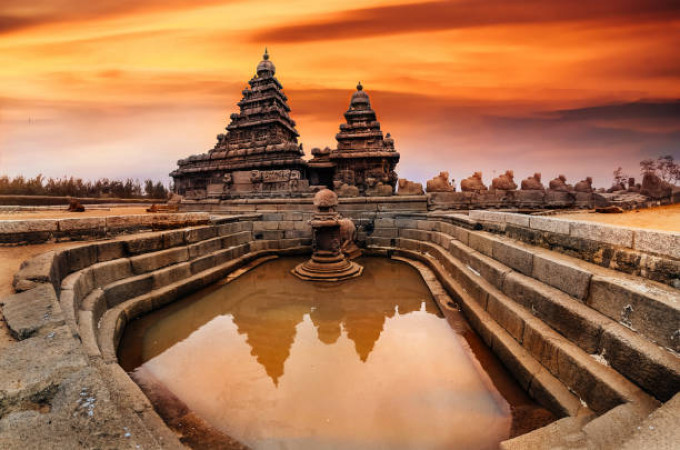Kumbakonam
Duration
2 to 4 Days
2 to 4 Days
Best time to visit
Nov-Feb
Nov-Feb
Theme
Religious, Heritage
Religious, Heritage
Kumbakonam Travel Guide
Kumbakonam, located in the southern state of Tamil Nadu, India, is a historic town known for its rich cultural heritage and religious significance. Nestled along the banks of the Cauvery River, Kumbakonam is famous for its intricately designed temples, vibrant festivals, and traditional silk weaving industry.Top Attractions in Kumbakonam
- 1. Airavatesvara Temple
- 2. Sarangapani Temple
- 3. Mahamaham Tank
- 4. Kumbeswarar Temple
- 5. Swamimalai Murugan Temple
Kumbakonam is Famous for
Known for its magnificent temples and annual festival celebrations that attract devotees and tourists from all over the world.Top Attractions in Kumbakonam
- Exploring the ancient temples
- Witnessing the vibrant Mahamaham festival
- Indulging in traditional silk shopping
- Tasting the local cuisine
What's Great about Travelling to Kumbakonam?
- Immersing in the rich cultural heritage
- Perfect for history and architecture enthusiasts
- Experiencing traditional South Indian festivals
What's Not So Great about Travelling to Kumbakonam?
- May not be suitable for travelers seeking a bustling nightlife
- Limited vegetarian food options for non-vegetarian travelers
- Language barrier for non-Tamil speaking tourists
Travel Tips for Kumbakonam
- Check temple timings and dress codes before visiting
- Carry sufficient cash as many places may not accept cards
- Respect local customs and traditions while exploring temples
Important Kumbakonam trip information
- Ideal Duration: A 2-3 day trip is ideal to explore the major attractions.
- Best Time to Visit: The winter months from November to February offer pleasant weather for sightseeing.
- Nearby Airports and Railway Stations: The nearest airport is Tiruchirappalli International Airport, and Kumbakonam has its own railway station.
Top 5 Places to visit in Kumbakonam
Total
8,999
*EXCLUDING APPLICABLE TAXES Per Person
41,203
*EXCLUDING APPLICABLE TAXES 5.0 Ratings
( 393 Reviews )
( 393 Reviews )
Total
6,999
*EXCLUDING APPLICABLE TAXES FAQ's on Kumbakonam
Q1: What is the best time to visit Kumbakonam?
The best time to visit Kumbakonam is during the winter months from November to February when the weather is pleasant and ideal for exploring the temples and heritage sites. Avoid the monsoon season from June to September due to heavy rainfall, which may disrupt travel plans. The summer months from March to May can be hot and humid, so it's advisable to carry sunscreen and stay hydrated.
Q2: Do I need a visa to travel to Kumbakonam?
Most visitors to Kumbakonam will need a tourist visa to enter India, of which Kumbakonam is a part. Make sure to check the specific visa requirements based on your nationality before traveling. Some countries may be eligible for visa-on-arrival or e-visa facilities, but it's essential to confirm this information well in advance of your trip.
Q3: What are the must-visit attractions in Kumbakonam?
Kumbakonam is renowned for its numerous temples, including the Airavatesvara Temple, Sarangapani Temple, and Darasuram Temple, all UNESCO World Heritage Sites. Don't miss the Mahamaham Tank, a sacred water tank, and the Kumbeswarar Temple. Explore the vibrant marketplaces like Potramarai Kulam and taste the famous Kumbakonam Degree Coffee. The town is also known for its festivals, with the Mahamaham festival held once every 12 years being a major highlight.
Q4: Is Kumbakonam a safe place to travel?
Kumbakonam is generally a safe destination for travelers. However, like any other place, it's advisable to be cautious of your surroundings and belongings, especially in crowded areas or markets. Avoid walking alone at night in unfamiliar places and always use authorized transportation services. Stay informed about any local guidelines or restrictions, and follow basic safety precautions to have a hassle-free experience in Kumbakonam.
Q5: What is the local currency in Kumbakonam and can I use credit cards?
The local currency in Kumbakonam, as in the rest of India, is the Indian Rupee (INR). While credit cards are widely accepted in hotels, upscale restaurants, and larger stores, it's recommended to carry cash for smaller establishments and local markets. ATMs are available in the town for convenient access to cash. Inform your bank about your travel plans to avoid any issues with card transactions.
Q6: What is the local cuisine like in Kumbakonam?
Kumbakonam offers a rich culinary experience with traditional South Indian cuisine. Indulge in local delights like Dosai, Idli, Vada, and Pongal for breakfast. Don't miss the flavorful Sambar, Rasam, and traditional Thali meals for lunch or dinner. Taste the famous Kumbakonam Degree Coffee, a unique filter coffee preparation. Vegetarian options are prevalent, but you can also find non-vegetarian dishes like Chettinad Chicken and Fish Curry. Be prepared for spicy flavors and enjoy the variety of chutneys and pickles that accompany many dishes.
Q7: What transportation options are available in Kumbakonam?
In Kumbakonam, transportation options include auto-rickshaws, cycle rickshaws, and taxis for short distances within the town. You can also rent a car or hire a driver for more extended trips to nearby attractions. Public buses connect Kumbakonam with other towns and cities, offering an affordable way to travel around the region. If you prefer a more adventurous experience, consider renting a bike to explore the town at your own pace. Always negotiate fares beforehand and confirm transportation arrangements with reliable providers.
Q8: Are there any cultural norms or etiquette I should be aware of when visiting Kumbakonam?
When visiting Kumbakonam, it's essential to respect local customs and traditions. Dress modestly when visiting temples and religious sites, covering your shoulders and knees. Remove your footwear before entering sacred places and follow any specific rules or rituals observed by locals. Greet people with a respectful "Namaste" and avoid public displays of affection. Ask for permission before taking photographs, especially of individuals or religious ceremonies. It's customary to accept or offer items with your right hand and show reverence to elders. Embrace the cultural diversity of Kumbakonam with an open mind and be mindful of the community's values and practices.
Q9: I am a travel agent. How can I buy travel leads of Kumbakonam?
Register yourself as a travel agent at agents.tripclap.com and then you can buy travel leads to Kumbakonam once your account is approved. For more details contact our support team at +91-8069186564 or support@tripclap.com
